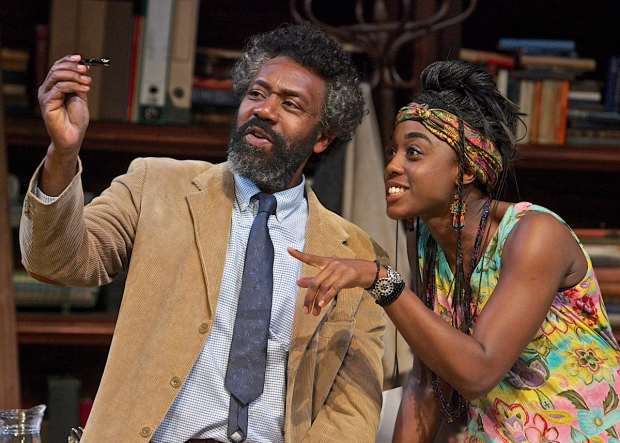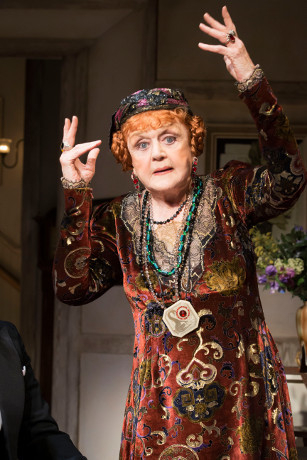Michael Coveney: Remembering the lost lines of Lenny Henry and others
‘The actor’s nightmare of drying on stage is always vivid but, in the event, it’s never catastrophic’

© Francis Loney
In the middle of a scene, Lenny lost his way and left the stage. Moments later he returned and picked up the thread. No-one held this aberration against him, and he received very favourable reviews. But a chill goes down your spine. It's the fear, the stage-fright, the sudden realisation you don't know what happens next… and it has afflicted actors from time immemorial, from Olivier to Ian Holm, from Michael Redgrave to Richard Dreyfuss.
It's usually a problem for older actors. Michael Gambon says he won't act on the stage anymore because he can't learn the lines. Ian McKellen, no longer dismissive of what is usually the first question at any audience Q&A – "How do you remember all the lines?" – admits that it's becoming far harder nowadays to learn them in the first place.
When I was a student and amateur actor I never had this problem because I only played tiny parts with a few lines here and there. But I still dream of finding myself on a stage with nothing to say, and of going out to bat for England (through some fluke of the selection process) with nothing to offer. The cricket dream always follows me from the pavilion to the crease. And then I wake up in a cold sweat.
And I'm still haunted by a school concert at which my chum Bill Turner (violin) and I (piano) played the beautiful, but quite fast, first movement of the Spring sonata by Beethoven and came badly unstuck on about the fourth page. I did a Lenny. I stopped and stood up from the stool. But unlike Lenny, we couldn't then sit down and resume where we'd hiccupped. We re-started from the top. We played the perfect innings. The applause was tumultuous.
The actor's nightmare of drying on stage is always vivid but, in the event, it's never catastrophic, simply because the audience really doesn't mind one bit. And actors such as Simon Callow and Michael Simkins can always bang out a highly entertaining newspaper column – as they did last week, in the Times and the Daily Mail, respectively – about the perils of a fleeting memory lapse while on the job.
Then there is the theatre-hating journalist – this week Elizabeth Day in the Observer – gloating that Lenny's accident redeemed the whole miserable experience for her, gave her something she couldn't buy for the far more reasonable price of a cinema ticket.
Mind you, it doesn't sound as if Lenny's "dry" was half as entertaining as Ralph Richardson's when he stopped half-dead in his tracks and asked if there was a doctor in the house. One stood up in the front stalls. "Doctor," said Richardson, "isn't this a terrible play? What can we do about it?"
Another request for a doctor in the house occurred in the middle of a Mike Leigh play, Ecstasy, at Hampstead Theatre, when Jim Broadbent had to leave the stage, ill, and passed out in the loo. As this was Hampstead, 14 doctors stood up to offer assistance.
'You could see his ear-prompt-piece a mile off'
Sometimes, actors don't even turn up before they have to leave, like Broadbent. The legendary Wilfrid Lawson, playing the Button Moulder in the fifth act of Peer Gynt at the Old Vic, stayed with his guests, Richard Burton and Liz Taylor, in the circle (and the circle bar) until half-way through the last act when he leaned across to Burton and said, "Watch this, this is a good bit, this is where I come on…" and sat there waiting for himself to appear.
"When my cue comes, call me," says Bottom, but cues, like prompts, are not always helpful. Alfred Lunt and Lynn Fontanne were an inseparable high comedy couple, onstage and off, in the 1920s. In the middle of a scene, they both dried. Several loud prompts later, Lunt hissed to the wings: "We know what the line is, but which one of us says it?"

© Johan Persson
Another great trouper, Gladys Cooper, came to the rescue at an awkward moment in The Chalk Garden when a rogue telephone rang on the stage (this was before mobiles in the stalls). A coven of high comedy actors froze to the spot. One of them, Joan Greenwood, exhaled a light breeze of relief and delight as Gladys moved heroically downstage to answer the phone. She picked up the handset and, holding it upstage towards Joan, simply said. "It's for you, dear."
Elderly actors often resort to radio mics. The glorious Angela Lansbury wasn't wearing those glamorous ear muffs for nothing when she played Madame Arcati in Blithe Spirit last year. She was a model of discretion next to Richard Dreyfuss at the Old Vic six years ago in a play called Complicit. You could see his ear-prompt-piece a mile off. No-one minded much about that either, as the lines of the play, as they thudded to the floor, were utterly unmemorable, and not just to Dreyfuss.
An early type of ear prompt was worn by Michael Redgrave in his gloaming years at the Mermaid, but the trouble was that nearby radio cabs picked up the signal and tuned in, so that audiences were bemused by loud, crackling instructions for cab number so-and-so to pull his finger out and go immediately to London Bridge and take Mr Jones to Oxford Street, or even to High Wycombe.
Microphones backfire, prompters lose the plot, actors get stranded in limbo, like Sir Lenny in Chichester. The best security against losing one's way was devised by a leading amateur actor I knew (and indeed worked with) in Ilford, Essex, in the late 1960s. His name was James Cooper, and he ran a company called the Renegades (whose alumnae include John Alderton, John Woodvine, Liz Robertson, producer Denise Silvey and Ken Campbell); Jimmie played the lead role, designed and built the set, manned the box office, did the lighting, and directed the show.
He never knew his lines, but he knew where to put them: on his cuffs, in cupboards, inside drawers, in the bookshelves, on the ceiling, under the carpet. His performance became this wonderful fluent, mimetic cabaret as he appeared to improvise and then carve the play out of thin air while using every available surface and cubby hole on the stage.
He was an unforgettable one-off, James Cooper, and his line-truffling the most enjoyable form of "physical theatre" in all my days. Now, with my "what's best to see" hat on, you simply must catch a brilliant new play about amnesia that's transferring from the Tricycle to the West End. I forget what it's called…












